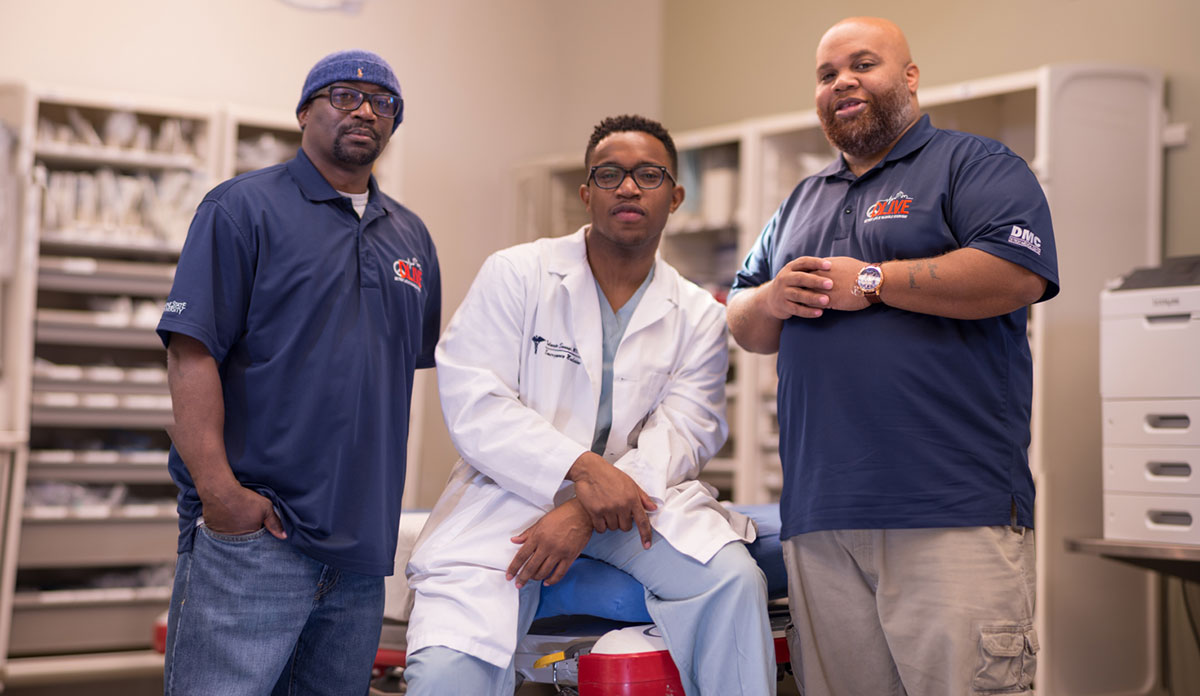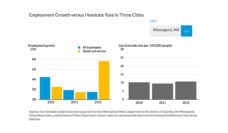Dr. Deborah Sims and Dr. Brack Bivens followed 263 patients admitted for trauma to the Henry Ford Hospital in Detroit in 1980 and 1981. After five years, 114 of these patients had experienced another trauma that brought them to the hospital and 52 had died. Sims and Bivens concluded that urban trauma is actually a “recurrent disease related to lifestyle, environment, and other factors of its victims” rather than an “acute episodic event.”
Decades later, in the same city with the highest death rate in the United States for children up to the age of 18, and homicide the number one cause of death for those 15 to 34 years old, Dr. Tolulope Sonuyi, Ray Winans, and Calvin Evans launched Detroit Life is Valuable Everyday or DLIVE. This organization attempts to interrupt the cycle of violence described by the Sims and Bivens study.
Dr. Sonuyi, an emergency medicine physician at Detroit Medical Center Sinai-Grace Hospital, saw night after night that many of the victims of violence he treated were cycling in and out of the Emergency Department. He wanted to change the business-as-usual attitude of dealing with preventable violence trauma and its associated morbidity and premature mortality. For Dr. Sonuyi, “it became impossible to ignore the foremost public health crisis for Detroit youth and young adults because you are seeing it in some shape or form on a daily basis, whether at work or in the community.”
DLIVE’s approach
DLIVE is a hospital-based intervention program, located in the Emergency Department of the Detroit Medical Center Sinai-Grace Hospital. Detroit Medical Center Sinai-Grace Hospital saw about 600 cases of violent trauma victims (gunshot or stabbing) a year between 2009 and 2013. The program looks to transform every acute trauma episode for victims ages 14 to 30 years old into a “teachable moment.”
Perhaps the most important piece of the approach is led by the Violence Intervention Specialists — Winans and Evans — who have experienced trauma before and thus have an intimate understanding of the victims’ mindsets. These interventionists are called to a patient’s bedside and if the patient is deemed to be at a high risk of another traumatic event due to “circumstances and lifestyle,” and consent to participation, they are offered a place with DLIVE.
DLIVE’s programming is guided by a trauma-informed approach which “looks to reduce contributory risk factors but also acknowledges the importance of mental healthcare and avoidance of re-traumatization.” Winans and Evans make sure to connect participants to resources to gain employment, access education, legal advocacy, and more. Their ability to truly transform trauma lies in their ability to develop and apply innovative engagement and outreach strategies. The advice and connections are personalized. As Evans puts it, “Don’t treat the individual like a perpetrator, treat him as a victim.” and includes contact with participants’ family member. Each month, participants of DLIVE also attend a weekly Trauma Peer Group.
Their ability to truly transform trauma lies in their ability to develop and apply innovative engagement and outreach strategies. The advice and connections are personalized.
Currently, there are 45 individuals enrolled with a retention rate of 84%. Over 80% of the participants are either employed or in school. Their preliminary research data suggests that approximately 20% of individuals will be re-injured within one year without any intervention. To date, the repeat trauma rate for DLIVE is 0%. Unfortunately, a few of the instances when individuals did refuse the DLIVE intervention, they were either re-injured or killed in less than six months.
Winans and Evans credit much of the success of the program to the close relationship DLIVE has with Detroit Medical Center Sinai-Grace Hospital and its staff. The program is housed in a small room off the main corridor by the Emergency Room stocked with two capable interns, photos of the DLIVE team and events, and posters reiterating the team’s approach to trauma (the Five P’s of Violence: Premature, Predictable, Pathologic, Public Health Problem, and Preventable). Much of the important work happens outside of that room. As Winans and Evans walk through the hallways of the hospital, it is clear that they have relationships with just about everyone, ranging from the cafeteria staff to nurses to the administrative staff. It makes it easy for Winans and Evans stop by a nurse station on a floor to discuss a few patients with the nurses whether they believe the patient would be a good candidate for a program like DLIVE.
DLIVE is the only program of its kind in Michigan and is part of a larger network called the National Network of Hospital-Based Violence Internship Programs (NNHVIP) which has slowly grown over the past twenty years. There are 35 such violence intervention programs in the U.S., Canada, England, and El Salvador.
Impact of hospital-based violence intervention programs
The impact of NNHVIP programs is still being evaluated. Studies show both encouraging results and areas for improvement. For example, the Wraparound Project at the San Francisco General Hospital showed a reduction in the violent re-injury rate from the 8.4% to 4.9% over the last ten years for 466 participants. But Wraparound also found that addressing various social determinants of health, especially housing and education when needed, is crucial to reducing the risk of re-injury.
Dr. Sonuyi notes that DLIVE would not be possible without the support of organizations from many different sectors within the Detroit community: Skillman Foundation, DMC Foundation, Blue Cross Blue Shield of Michigan Foundation, Michigan VOCA Program, and Flinn Foundation. Looking ahead, the DLIVE team hopes to change the approach to trauma and violence in other sectors such as education and criminal justice. Their goal would be to shift “away from maladaptive, superficial, and futile responses (i.e. school suspensions, wound repair and discharge, mass incarceration) to those that are trauma-informed and focused on holistic targeted intervention and prevention.” In the meantime, Dr. Sonuyi, Winans, and Evans will carry on their work with DLIVE, with continued support from Wayne State University Department of Emergency Medicine, breaking cycles of violence for more patients and expanding to another hospital in the coming year.
Feature image courtesy of Detroit Life Is Valuable Everyday (DLIVE). From left to right: Calvin Evans, Dr. Tolulope Sonuyi, Ray Winans.













